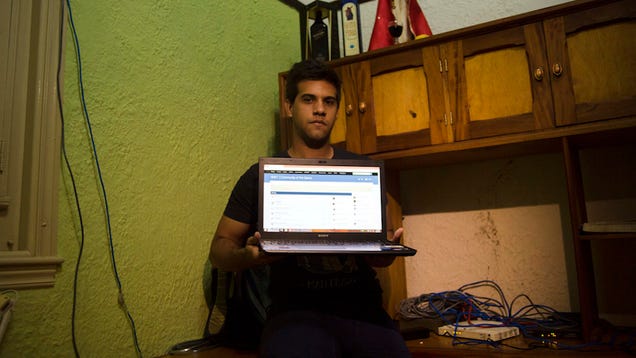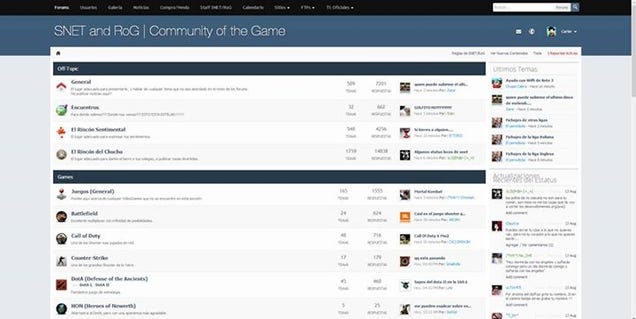Cuba's Illegal Underground Internet Is Thriving
In Old Havana's last remaining internet cafe, an hour online costs about almost a quarter of an average monthly salary. But armed with some piecemeal networking equipment and rebellious sensibilities, some Cuban youths have taken connectivity into their own hands.
Beginning in 2001, a small community of tech-savvy Cubans have been building a sprawling mesh network that stretches across Havana. This crowdsourced connectivity takes advantage of hidden Wi-Fi antennas and broadband cables stretched across rooftops to network over 9,000 computers across different neighborhoods in Cuba's capital. The resultant Snet, or streetnet, enables people to exchange news updates, share files, and even play online games like World of Warcraft. But there are rules.
A gaming forum maintained by Broche Moreno on Snet
"We aren't anonymous because the country has to know that this type of network exists. They have to protect the country and they know that 9,000 users can be put to any purpose," Rafael Antonio Broche Moreno, the 22-year-old electrical engineer pictured above who helped build Snet, told the Associated Press recently. "We don't mess with anybody. All we want to do is play games, share healthy ideas. We don't try to influence the government or what's happening in Cuba ... We do the right thing and they let us keep at it."
The young engineer explained that Snet has a strict zero porn policy. Discussing politics or linking to the outside internet from Snet will also lead to punishment in the form of being blocked from accessing the network. Meanwhile, the very architecture of Snet is entirely illegal—in part due to the unsanctioned use of Wi-Fi equipment—so keeping users in check is integral to keeping them online.
The recent developments in the relationship between the United States and Cuba is giving the Snet youth hope for a better connected future. The sheer lack of Wi-Fi equipment, much of which comes from the United States, limits how much the Snet architects can build. And while the mesh network is limited to a few thousand users, the alternative is much more analog. It comes in the form USB drives full of news articles, TV shows, and movies that are passed from one person to the next. It's a very pure kind of peer-to-peer networking if you think about it. "It's a solid underground," a young Cuban blogger told The New York Times a few years ago. "The government cannot control the information."
Well, at this point, it seems clear that the Cuban government sort of can. With trade embargoes still denying people of proper equipment and bans forbidding them from using what they have, the Cuban government is doing a pretty good job of keeping most of its citizens quiet. But the thousands of renegades who won't be silenced shine like a beacon of hope. It's a new era for Cuba, and it's one that people like Snet users are eager to shape. They've been splendidly impatient so far. Imagine what will happen when the bans are lifted. [AP, NYT]
Images via AP










No comments:
Post a Comment
Please leave a comment-- or suggestions, particularly of topics and places you'd like to see covered